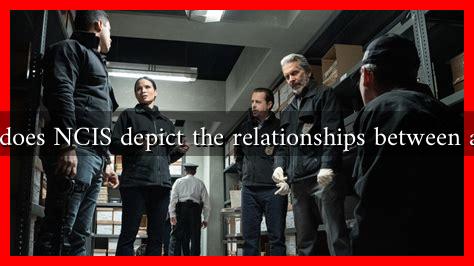-
Table of Contents
How Does NCIS Depict the Relationships Between Agents?
The television series NCIS (Naval Criminal Investigative Service) has captivated audiences since its debut in 2003. Beyond its thrilling plots and intricate investigations, the show offers a rich tapestry of interpersonal relationships among its characters. These relationships are pivotal in shaping the narrative and providing depth to the characters. This article explores how NCIS depicts the relationships between agents, highlighting key dynamics, character development, and the impact of these relationships on the overall storyline.
The Core Team Dynamics
At the heart of NCIS is a core team of agents, each with distinct personalities and backgrounds. The interactions among these characters create a compelling dynamic that drives the series forward.
. The primary relationships can be categorized as follows:
- Mentorship and Leadership: The relationship between Special Agent Leroy Jethro Gibbs and his team members is a cornerstone of the series. Gibbs, portrayed by Mark Harmon, serves as a mentor and father figure, guiding younger agents like Tony DiNozzo and Ziva David. His leadership style is characterized by a mix of tough love and unwavering support.
- Friendship and Camaraderie: The friendships among agents, particularly between Tony DiNozzo and Timothy McGee, showcase a blend of rivalry and loyalty. Their banter adds humor to the series while also highlighting the importance of teamwork in high-stress situations.
- Romantic Relationships: Romantic subplots, such as the evolving relationship between Tony and Ziva, add emotional depth to the series. Their on-again, off-again romance reflects the complexities of balancing personal feelings with professional responsibilities.
Character Development Through Relationships
NCIS excels in character development, often using relationships to reveal deeper layers of its characters. For instance, the character of Abby Sciuto, the forensic scientist, is portrayed as quirky and upbeat. Her relationships with other agents, particularly Gibbs, showcase her vulnerability and loyalty. Abby’s emotional investment in her colleagues often leads to poignant moments that resonate with viewers.
Moreover, the show explores the impact of trauma and loss on relationships. The character of Ziva David, played by Cote de Pablo, experiences significant personal loss, which affects her interactions with the team. Her journey of healing and reconnection with her colleagues illustrates the show’s commitment to portraying realistic emotional arcs.
The Role of Trust and Loyalty
Trust and loyalty are recurring themes in NCIS, often depicted through the agents’ willingness to put their lives on the line for one another. This is particularly evident in high-stakes situations where the team must rely on each other’s skills and instincts. The series frequently emphasizes the idea that trust is built over time, often through shared experiences and challenges.
- Teamwork in Crisis: Episodes that involve hostage situations or undercover operations highlight the agents’ reliance on one another. For example, in Season 13, Episode 24 (“Family First”), the team must work together to rescue Gibbs, showcasing their unwavering loyalty.
- Personal Sacrifices: Characters often make personal sacrifices for the sake of their colleagues. This is evident in the character of Leon Vance, who frequently prioritizes the safety of his team over his own career ambitions.
Impact on Storylines and Viewer Engagement
The relationships between agents in NCIS significantly impact the storylines and viewer engagement. The emotional stakes created by these relationships draw viewers into the narrative, making them invested in the characters’ journeys. The show’s ability to balance action with emotional depth is a key factor in its longevity and popularity.
Statistics support this notion; NCIS has consistently ranked among the top-rated shows on television, with millions of viewers tuning in each week. The strong character relationships contribute to this success, as audiences become attached to the characters and their evolving dynamics.
Conclusion
In conclusion, NCIS masterfully depicts the relationships between agents, weaving together themes of mentorship, friendship, trust, and loyalty. These relationships not only enhance character development but also drive the narrative forward, creating a compelling viewing experience. As the series continues to evolve, the dynamics among its characters remain a central focus, ensuring that NCIS will remain a beloved staple in the realm of crime drama.
For more insights into the world of NCIS and its characters, you can visit the official NCIS website at CBS NCIS.





